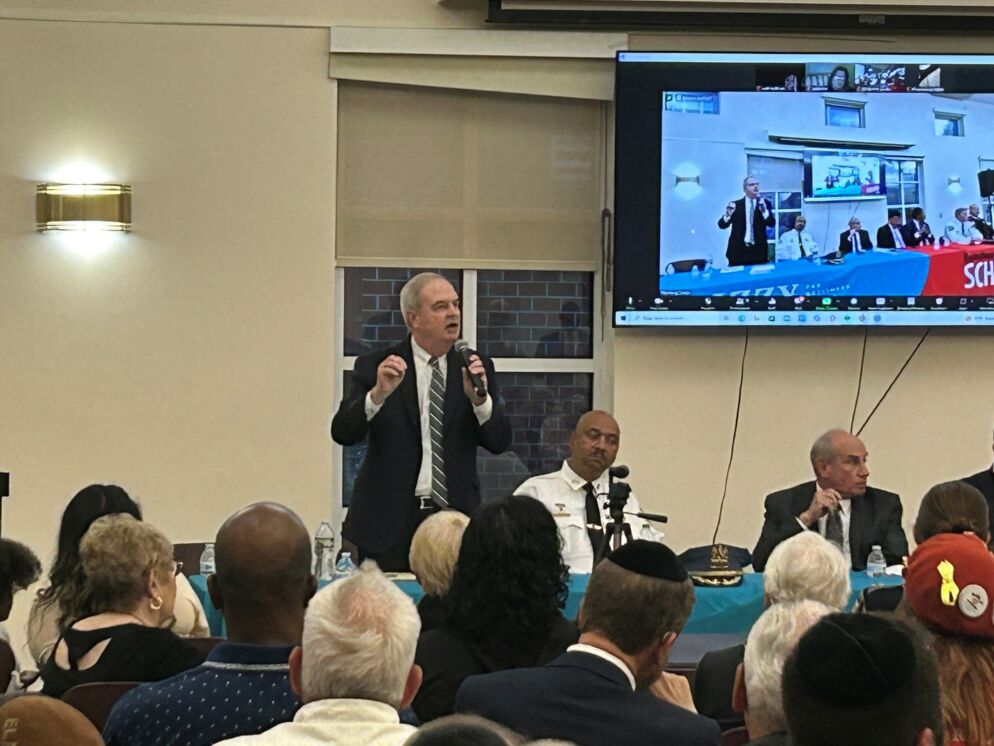
By John Rydell
As he returned home from an Orioles game one night, Baltimore City Councilmember Isaac “Yitzy” Schleifer spotted a speeding car he suspected was stolen.
“When I watched from a distance, I saw a juvenile get out from the back seat, holding a gun and running toward a woman who was walking to her house,” he said. Schleifer then blasted the horn of his SUV and startled the teen. He said the youth ran back to the car, which then sped away.
Carjackings in Baltimore City this year have actually declined by more than 100, compared with the same period last year, according to the Baltimore Police Department. But car thefts in the city have more than tripled during the same period.
Schleifer and Baltimore County Councilmember Izzy Patoka, who are both Jewish, recently hosted what they called “a regional conversation about public safety” at the Edward A. Myerberg Center. The Myerberg Center is a program of CHAI: Comprehensive Housing Assistance, Inc., an agency of The Associated: Jewish Federation of Baltimore.
The forum, which attracted nearly 300 people, featured newly confirmed Baltimore Police Commissioner Richard J. Worley, Jr.; newly confirmed Baltimore County Police Chief Robert McCullough; Baltimore City State’s Attorney Ivan Bates and Baltimore County State’s Attorney Scott Shellenberger.
A majority of those who showed up expressed fear about juvenile crime in their communities. Two residents voiced their concerns to panel members about late-night drag racing on Northern Parkway and in other parts of the city.
Bates said he is following up on a campaign pledge to hold people accountable for minor crimes like loitering, trespassing and possession of drugs but without putting them in jail. Violators are required to perform five hours of community service. Bates added that “many offenders need drug treatment, job training, job placement skills, whatever it is, that’s what we’re doing in the criminal judicial system to make sure that we work with the police, and do it in a way that’s not putting people in handcuffs.”
Shellenberger said he is frustrated by two laws enacted last year by the General Assembly.
One of those laws is the Juvenile Interrogation Protection Act and the other is the Juvenile Justice Reform Act, which prohibits prosecutors from charging juveniles 13 and under for most crimes, except for felonies and violent crimes. Shellenberger cited the case of a 12-year-old boy in Anne Arundel County who was caught with a gun in his elementary school.
“If you’re a 12-year-old and walk into your school with a gun, you need to be charged,” he said.
But Shellenberger said the new law prohibits prosecutors from doing so. Another part of the law limits juveniles found liable for misdemeanors to just six months probation, and those found responsible for felonies can serve no more than one year of probation. Another law would prohibit juveniles in custody from being questioned by police without consent from the parents. Shellenberger said the law also requires public defenders to intercede and, in most cases, advise juveniles to say nothing.
In response, Baltimore City Senator Jill P. Carter, a Democrat who represents Northwest Baltimore, said, “I don’t think changing or repealing those laws would have much, if any effect on the amount of carjackings or auto thefts. But I do think that the police and prosecutors need to work more collaboratively with the Department of Juvenile Services and Department of Social Services to curtail a lot of the crime and make sure they’re steering young people in the proper direction.”
Carter was a co-sponsor of the two bills enacted last year. But she added: “These pieces of legislation passed the General Assembly overwhelmingly. The Juvenile Reform Act was not vetoed by Gov. Larry Hogan and allowed to become law.” Carter added that the legislation was actually prompted by the Department of Juvenile Services. “If these laws were so awful, I don’t think they would have gotten through.”
She blamed the uptick in car thefts and carjackings, in part, on societal problems, including the growing influence of social media. She cited the so-called “TikTok challenge” where videos show young people how certain vehicles can be easily stolen.
Carter, an attorney who often represents juveniles, added: “It’s a little heartbreaking because we should be trying to figure out how to make these children better, not to lock them up and put them in a dungeon and throw away the key at 11 years old.”
As for the recent spike in crime, Schleifer said: “This is life and death. I’m not going to back down. I’m going to do whatever I can to protect my constituents.”







